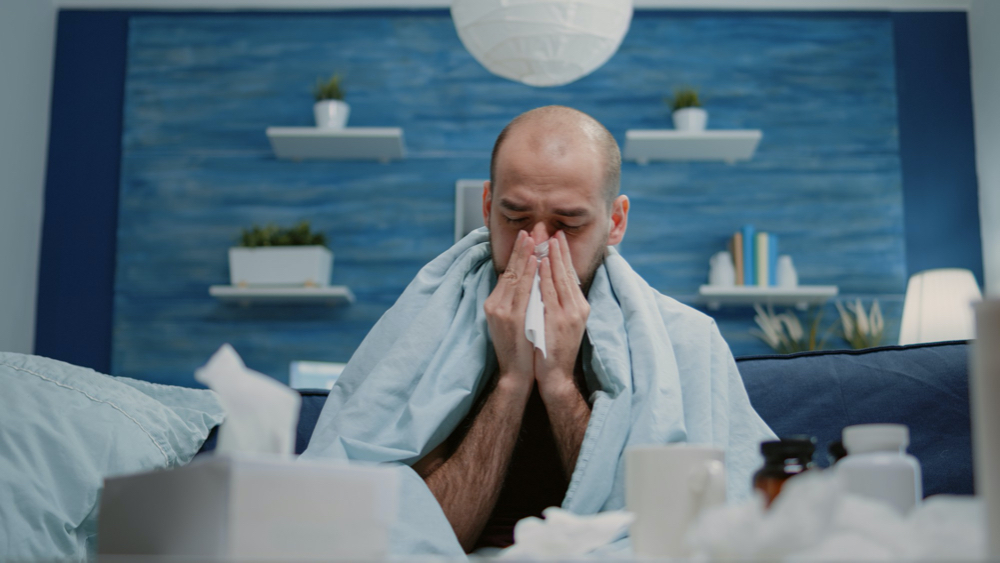- Fast results
- 4,000+ locations
- 4.8 star rating
Need Help? (888) GET LABS



The information in this article is not intended to replace professional medical advice, diagnosis, or treatment. Instead, consult your physician or any licensed healthcare providers if you have questions.
Trying to sleep with a clogged nose at night can be a real struggle if you don’t know how to get relief. You may end up tossing and turning, trying to drain the nasal congestion. But you can skip all these with the most effective techniques, allowing you to find the best way to sleep with a clogged nose. From lying on your side, raising your head, to using decongestants, and doing steam inhalation, check out the steps on how you can relieve a stuffy nose.
By placing an extra pillow under your head when you sleep, you can prevent mucus from accumulating in the nasal cavity, which primarily causes clogging as your nasal passage can be blocked by mucus. The right degree of elevation should give you the most comfort and allow you to breathe comfortably. Try to add more pillows until your stuffy nose becomes decongested.
Instead of lying on your back, try sleeping on your side to ensure a wider pathway and better drainage of the clogging. Determine which position and side relieves pressure in the sinuses and decreases congestion.
When you inhale steam, you loosen mucus in your nasal passages, which makes breathing easier. Put a towel over your head, fill a bowl with hot water, and breathe the steam in for approximately 10 minutes.
As an additional option, you can also drop a few drops of eucalyptus oil into the bowl of hot water. The calming properties of eucalyptus oil can help you relax before sleeping as a result of its aromatic properties.
A great alternative to eucalyptus oil is peppermint essential oil. Peppermint oil provides a cooling sensation that allows your nasal passages to open up, allowing you to breathe more freely.
A nasal spray or decongestant can provide immediate relief from a clogged nose at night. In addition to providing fast relief, nasal sprays containing oxymetazoline or phenylephrine, either available over-the-counter or in prescription form, can reduce the inflammation and congestion of your nasal passages by shrinking the blood vessels in the nasal passages.
Additionally, you can use a nasal strip to improve the flow of air through your nasal passages and open up your nasal passages. By placing these adhesive strips on the bridge of your nose, you can gently lift your nostrils and widen the nasal passages, therefore making it easier for you to breathe through your nose.
Humidifying your bedroom can also help prevent nasal congestion at night. A dry environment can irritate your nasal passages, which can lead to inflammation, resulting in congestion. By adding moisture to the air, a humidifier keeps your sinuses hydrated and prevents congestion.
Stress can worsen nasal congestion. On the flip side, allowing your body to relax and keeping your mind calm helps alleviate a stuffy nose through more regulated breathing. Consider meditating or taking deep breaths before you sleep. You can also play soothing music or listen to calming sounds. If you have trouble relaxing due to stress, check out our guide on ways to address sleeping problems if you have anxiety.

Various things can cause a stuffy nose at night. One common cause is allergies. You can get allergic rhinitis from pollen, pet dander, or dust mites, which can cause inflammation and congestion in your nasal passages.
Colds can also cause nighttime nasal congestion. Colds make your nose stuffy because the nasal passages get swollen and produce excess mucus to expel the disease-causing culprit.
Clogged noses can also be caused by sinusitis, which is an inflammation of the sinuses. In most cases, sinusitis occurs because of a viral or bacterial infection, which causes the sinuses to become blocked, resulting in nasal congestion.

Although most cases of nighttime nasal congestion can be relieved by home remedies and OTC medications, medical attention may be needed in some cases. For example, if you experience chronic or severe nasal congestion for an extended period, it’s essential to consult a healthcare professional.
Keep in mind that chronic nasal congestion can be a symptom of underlying conditions, such as nasal polyps, deviated septum, or chronic sinusitis. These conditions may require medical intervention, including prescription medications or surgical procedures, to alleviate the congestion and improve your sleep quality.
| Pro tip: If nasal congestion is determined to be a symptom of an infection, your doctor will likely request lab tests to make a proper diagnosis. Blood tests like a complete blood count (CBC) usually help confirm infection. |
Nasal congestion is common during pregnancy due to hormonal changes and increased blood flow to the mucous membranes. Using saline nasal sprays and maintaining a clean sleeping environment can help alleviate congestion.
Allergies can cause nasal congestion at night. Allergic rhinitis, triggered by allergens such as pollen or dust mites, can lead to inflammation and congestion in the nasal passages.
Certain essential oils, like eucalyptus and peppermint oil, can help relieve nasal congestion. However, it’s important to dilute them properly and use them with caution, as some essential oils can be irritating to the skin or mucous membranes.
Dealing with a clogged nose at night can be frustrating, but with the right remedies and lifestyle changes, relief is within reach. But if your nasal congestion persists or becomes chronic, it’s important to seek medical help to rule out any underlying conditions. With proper treatment and guidance, you can alleviate your nighttime nasal congestion and finally enjoy a peaceful night’s sleep.

© Copyright 2025 Personalabs. All Rights Reserved.